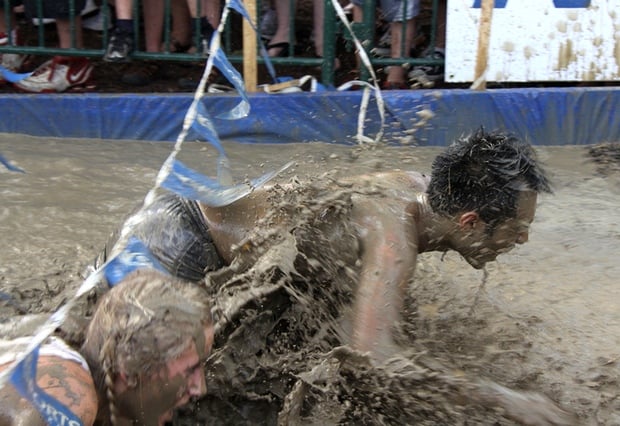Arlington resident Shanna Johnson enjoys running local races with friends. The problem is, after the third or fourth 5K or half marathon, those registration fees start to add up.
So Johnson often hops into the race last minute—without registering or paying for it. She’s done this enough—five times—that her friends often call her a race crasher. Among the larger running community, she’d be known as a race bandit.
Look closely enough and you’ll find these crashers at almost any race. They may be disguised as another runner—a young guy wearing a 40-year-old woman’s bib, for instance—or maybe they don’t even bother with the bib in the first place.
“Running just gets expensive,” says Johnson. “I don’t really need the free T-shirt.”
Such was the case for Robert A. Fecteau II, a Virginia runner who ran the Filthy 5K Mud Run in 2010 while wearing a woman’s bib. Unfortunately, Fecteau paid a deep price as a result: While crawling through a shallow mud pit near the finish line, he jammed his hands and arms, causing him to become partially paralyzed from the chest down.
Now he’s suing the race organizers—Richmond Sports Backers, Venture Richmond Inc., and the Road Runners Club of America Inc.—for $30 million, in addition to legal costs.
The lawsuit has drawn sympathy for both sides in the running community, while also reigniting an already heated debate on the etiquette of running a race unregistered.
“You want to feel bad for this guy, but the situation around it is really conflicting,” says Ray Pugsley, co-owner of Potomac River Running, which organizes approximately 18 to 20 races per year. “Nobody who goes out to do something athletic and have a good time should ever, God forbid, have [to experience] something awful as what happened to him.”
The tricky part, adds Pugsley, is whether the judge rules in favor of Fecteau or the defendants. If the judge rules in favor of Fecteau, Pugsley thinks that could mean an end to the increasingly popular mud runs and adventure races. “Ultimately, if anyone can get hurt in one of these races and sue the race organizer, then there’s going to be precedent to get hurt and sue. People take a bad situation and say, ‘How can I profit [from it]?’ All those companies will be chewing their fingernails seeing how this shakes out.”
Pacers event manager Kathy Dalby says she worries what may happen to the insurance rates of race organizers, including Pacers, which puts on popular local races such as the Parkway 5K (one that Fecteau has raced in before).
“The Sports Backers are an amazing organization. They put on some of the biggest races in the country,” Dalby says. “The first thing I think is, ‘Oh, my God, is my insurance going to go sky high?’ It’s already so difficult for people to get insurance for races.”
Dalby says unregistered runners don’t seem to understand the importance of the bib. “If [an accident] happens, the first thing you do is look up the runner’s bib number and information,” she explains. “Can you imagine if I’m calling this other person’s mother and telling her that her son is paralyzed?”
In the lawsuit, Fecteau says the mud pit was created with “negligence, reckless disregard, and/or gross negligence,” according to the Richmond-Times Dispatch, which first reported the story in May. Fecteau says the organizers encouraged racers to dive head-first into the mud pit. Still, he also acknowledged that his injury was the result of a “freak accident.”
But calling the situation a freak accident is exactly what runners are attacking Fecteau for in the race bandits debate. In the running forum Let’s Run, one commenter wrote, “Accidents happen, people get hurt. That doesn’t mean somebody else is responsible for you. He chose to take part in an activity with a risk of injury.”
While sympathetic to Fecteau’s situation, Johnson agrees with many runners’ arguments that Fecteau should have been aware of the heightened risk of doing a mud run. “When you run in those, you have to know the risk that you might get hurt.”
The defendants’ attorney, Stanley P. Wellman, told the Richmond-Times Dispatch, “Upward of 1,5000 runners have gone into that mud pit in each of the years the race has been staged, and all of them have come out unscathed, save for one.”
Adding even more twists to the lawsuit is Fecteau’s argument that he received permission from race officials to run under Aubrey Anthony’s name. He did not, however, re-sign the liability waiver for the race. Race organizers have disputed his allegation, the Times Dispatch reported.
According to records on the Virginia’s Judicial System website, a hearing for the lawsuit occurred on May 29. Dalby says she and other race organizers will be following the suit closely.
“For them to get beaned,” she says, “it would ripple throughout the entire country.”
What do you think about the lawsuit and running a race unregistered? Take our poll and share your thoughts in the comments section.



















